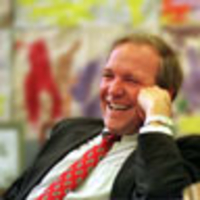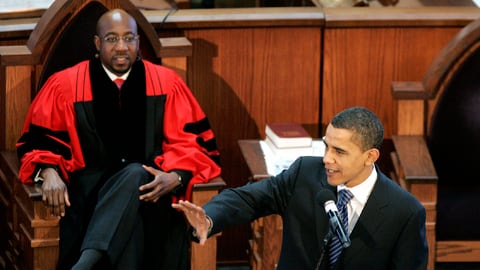
Liberals have practiced secular politics since the 1960s, but with the ascent of Barack Obama, the left discovered it can actually keep the faith.
When I was a high school kid in 1969, my church youth group leader took a bunch of us to Berkeley in the aftermath of the People’s Park uprising so we could soak in the café scene and experience some of what he was witnessing as a young seminarian at the Pacific School of Religion. The rigid establishment was being overthrown – in politics and the church – and something new in activism was being caffeinated. It would be a long time before that bundle of hormones would sit still again for Bible study.
The real measure of how Democrats succeeded in reaching out to the devout is located in the margins.
For the progressive left, social activism grounded in faith and theology crested in the 1960s. Martin Luther King Jr.’s “Letter from Birmingham Jail” was maybe the high water mark – a Biblical-based sermon addressed from one black preacher to a group of his white, Southern peers, calling for a radical transformation of perspective on the main social issue of the day.
That history needs to be remembered because faith-based social activism on the left largely disappeared for a generation in the aftermath of the 1960s. Various movements flowered – the antiwar, feminist, and environmental movements – and the action in the streets helped stimulate enormous social change. But organized religion – in the Catholic and mainstream Protestant denominations – began its slow, steady decline in the midst of the social turmoil.
For me, and maybe for many religious kids of the ‘60s, the church lost relevance the more it became a surrogate in the movement for social and political change. Why go to church to learn how to seize political power and change the established order? The more the debates in the pews became secular and political, the more the congregation left the sanctuary in order to put belief into practice.
The result was a long dormancy in which many Democrats became uncomfortable with open expressions of faith. Conservatives became the ones who invoked God and the Bible in the name of their narrow social-political agenda. Their majority was moral and their coalitions Christian and they married faith and political activism in the tradition we now call “wedge politics.”
The liberal faithful fled the scene in favor of latte and Tim Russert on Sunday mornings. Organized expressions of faith were rare at Democratic party gatherings. When I worked at the White House in the mid-1990s, I would not have dreamed of sharing my beliefs on faith with my colleagues. Our prayer and spiritual life was furtive even though we were all drawing on it to make it through rough and trying days. I sat next to George Stephanopoulos for a whole year on the campaign trail in 1996 and never discussed the moral turmoil he writes about in his book, All Too Human. More than once, I inadvertently interrupted Rahm Emanuel’s weekly session with his rabbi as they studied the Torah (yes, that Rahm Emanuel), but it never occurred to me to pull up a seat and join in the conversation.
All that is changing now. In Barack Obama, Democrats have put forth a man of strong religious faith who is comfortable connecting his spiritual life to his public role as a policymaker. Obama’s campaign benefited from a determined effort – which started during the 2004 campaign and accelerated since – to reach out to communities of faith and let them know that Democrats are their brothers and sisters.
Measuring the political impact of this faith outreach is tricky. It is still true that the more religious Americans who vote are more likely to be Republican and conservative. And it is still true that for most evangelical Christian voters, Democrats are off limits because their leadership does not believe that abortion is an unlawful taking of an innocent human life and that homosexuality is not a sin.
But the real measure of how Democrats succeeded in reaching out to the devout is located in the margins. Indiana is not a state that a Democrat could have carried without connecting in an authentic way to deeply religious voters. In places where Democrats organized real outreach to mainstream Protestant and Catholic congregations, the share of Obama’s vote went up compared to the percentage John Kerry won in 2004.
Connecting to religious people was pretty simple. More than three-fourths of all voters describe themselves as religious, and they are easily interested in how a candidate talks about his or her spiritual life and what it means as they think about the big issues of the day. During the primary season, various forums allowed candidates like Obama, Hillary Clinton, and others to profess their Christian faith and witness to the ways they are called to fulfill scriptural mandates to care for “the least, the last, and the lost.” None of the witnesses those candidates gave was phony: all of them, especially the new president-elect, seemed genuine in describing what the gospel news of Jesus requires them to do as humble servants of God.
So where does this all aim once we inaugurate our new president? For starters, President Obama will need to fulfill promises he made to care about those who suffer at home and around the world. The media and conventional pundits may not know that Obama pledged to end childhood hunger in America by 2015 but a lot of religious people will remember. Those who have volunteered as missions to the poor in developing lands will remember Obama’s promise to double foreign assistance. Those who believe that humankind is uniquely endowed by a Creator God to be stewards of that creation will watch very carefully to see what the new administration does to meet pledges on global climate change. And probably most important: all faith communities believe that war is a violence against God’s promise of shalom and ending the violence of war in favor of the diplomacy of peace will be a critical measure.
Many Democrats are rediscovering the connections that exist between the moral teachings of religion and the things we must do to create a community of the common good here in America. Our nation is entering hard, troubled, and painful times. It’s not a bad thing that the Democrats who are about to inherit positions of power have had a Great Awakening about how their own personal faith speaks to the needs of a dispirited nation in need of a big lift.
Mike McCurry was press secretary to President Bill Clinton 1995-98 and is now a Washington-based communications consultant and a graduate student at Wesley Theological Seminary.






